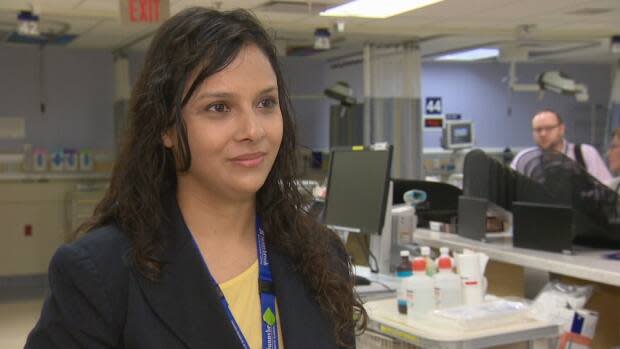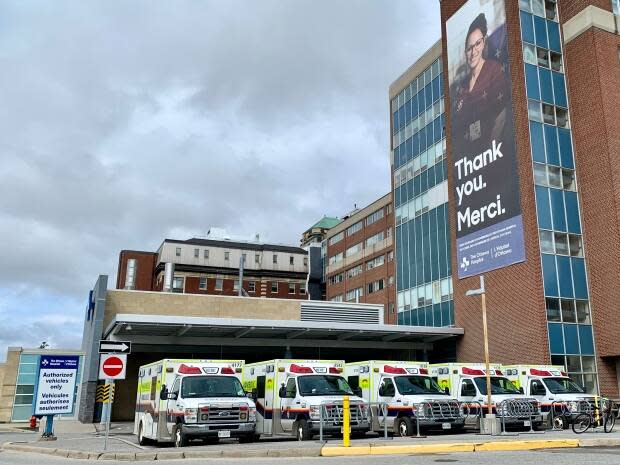Consulting surgeon might have led to 'different outcome,' Sargent inquest hears

Shannon Sargent might have been re-admitted to hospital — potentially increasing her chance of survival — if she'd been referred to a cardiac surgeon during an ER visit the day before she died in her jail cell, according to an expert witness who testified Thursday at a coroner's inquest into the Indigenous woman's death.
Sargent was 34 when she died at the Ottawa-Carleton Detention Centre (OCDC) in the early morning hours of July 20, 2016, 13 days after undergoing open-heart surgery to replace her aortic valve.
Earlier this week, the forensic pathologist who carried out the autopsy later that morning testified chronic drug use had contributed to the cardiac arrhythmia that ultimately caused her death.
On Thursday, Dr. Aikta Verma, the chief emergency physician at Toronto's Sunnybrook Hospital, told the inquest that if the doctors who examined Sargent when Ottawa police brought her to hospital the previous afternoon had consulted a cardiac surgeon while she was there, that specialist would likely have ordered further heart monitoring.
Sargent would likely have stayed in hospital, at least overnight, Verma said.
"I think those … are the major things that could have led to a different outcome," Verma testified during questioning by inquest counsel Mike Boyce.

'Bounce-back' patients
Sargent was complaining of chest pain when she was brought to the Civic campus of The Ottawa Hospital on the afternoon of July 19, 2016, following her arrest for missing a court appearance.
An electrocardiogram (ECG) report from that visit was "quite abnormal," Verma testified, and should have been compared to similar readings taken on July 11, after Sargent's surgery.
Verma testified that at her hospital, "bounce-back" patients like Sargent who return to the ER within 30 days of undergoing medical procedures — particularly those with a high risk of post-operative complications, such as cardiac surgery — are referred to a specialist as a matter of "standard practice."
"We cannot be specialists in all areas," she noted.
Instead of being re-admitted, Sargent was transported to OCDC where she underwent another medical examination and the decision was made to send her back to hospital.
According to the "health-care consultation form" prepared by an OCDC nurse, in addition to continuing chest pain, Sargent had low blood pressure and bloody diarrhea due to a C. difficile infection.

Conflicting testimony
There has been conflicting testimony about whether the correctional officer in charge of escorting Sargent back to the Civic that evening, Paul MacPherson, handed that medical form over to hospital staff.
Sargent was returned to OCDC without being triaged, and the nurse in charge at the time has testified he was never told she was waiting outside in a van.
Had she been reassessed, and considering her symptoms, a consultation with a cardiac surgeon "likely would have occurred," Verma said Thursday.
It's also "feasible and likely" that Sargent would have been in hospital rather than her jail cell when her heart failed, potentially tripling her chances of survival, she testified.
Verma also noted that Sargent's discharge on July 15, 2016, following her cardiac surgery was "sub-optimal" because she didn't leave the hospital with a social worker as planned.
That and other "social determinants" such as drug use, intermittent homelessness and difficulty accessing medication should have been flagged when Sargent returned to the Civic four days later, Verma said. They likely weren't, she said, because they weren't noted on Sargent's primary discharge document.
The Ottawa Hospital has since moved to a digital record-keeping system that makes it easier to flag such concerns, the inquest has heard.
'A foregone conclusion'
On Wednesday, Dr. Andy Pan, the emergency room physician who saw Sargent during her initial visit to the hospital on July 19, told the inquest that in his view, none of her test results that afternoon — including a chest X-ray and a "borderline" heart rate — necessitated a consultation with a cardiac surgeon.
"No, I didn't feel the threshold was met," Pan testified. "All of those were investigated and not found [to meet it]."
ER doctors at The Ottawa Hospital don't have the authority to admit patients, Pan told the inquest.
He also testified that discharge documents are normally handed to patients or their accompanying family members, but that he would never hand such confidential records to a police officer.
Sargent had no paperwork from the hospital when she arrived at OCDC later that afternoon, an oversight that would factor into the decision to send her back to the ER.

On Wednesday afternoon, Dean Joncas, a sergeant with 36 years' experience at OCDC, testified he has never seen an inmate escorted to hospital without being triaged.
"That's a foregone conclusion. If I'm sending an inmate out on an escort to go to the hospital, it's to be seen," Joncas told the inquest.
"And did you indicate that to c.o. MacPherson?" inquest counsel Kate Forget asked him.
"I don't recall saying that specifically, but there wouldn't be any need because every escort that we send out, whether it be to a clinic or the hospital, that's the idea, is that they're to be seen," Joncas replied.
The inquest, which is being conducted by video conference and will hear from approximately 25 witnesses over 10 days, is mandatory under the Coroners Act because the death occurred in custody. The jury can make recommendations aimed at preventing future deaths under similar circumstances.
Dr. Robert Reddoch is presiding over the inquest. Closing submissions are now expected Monday.


